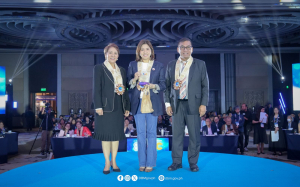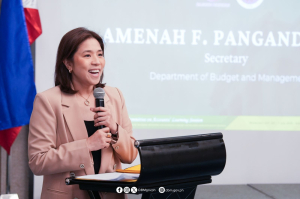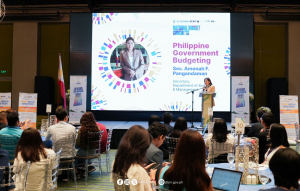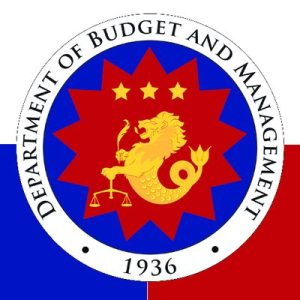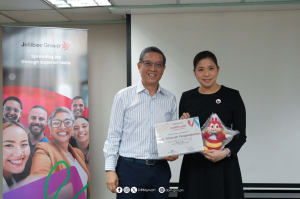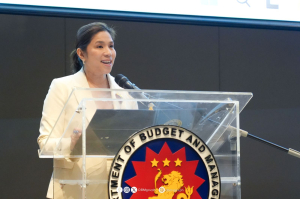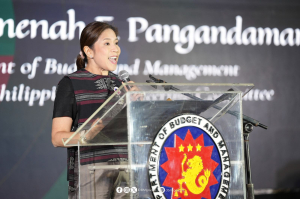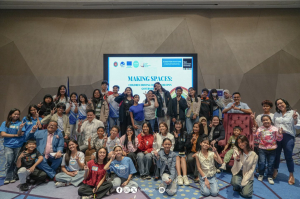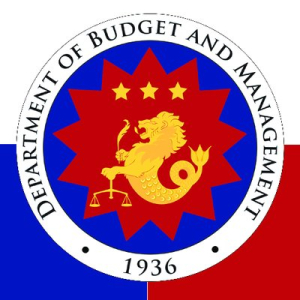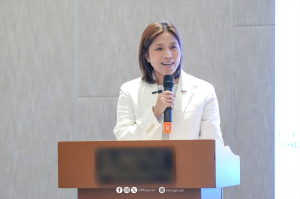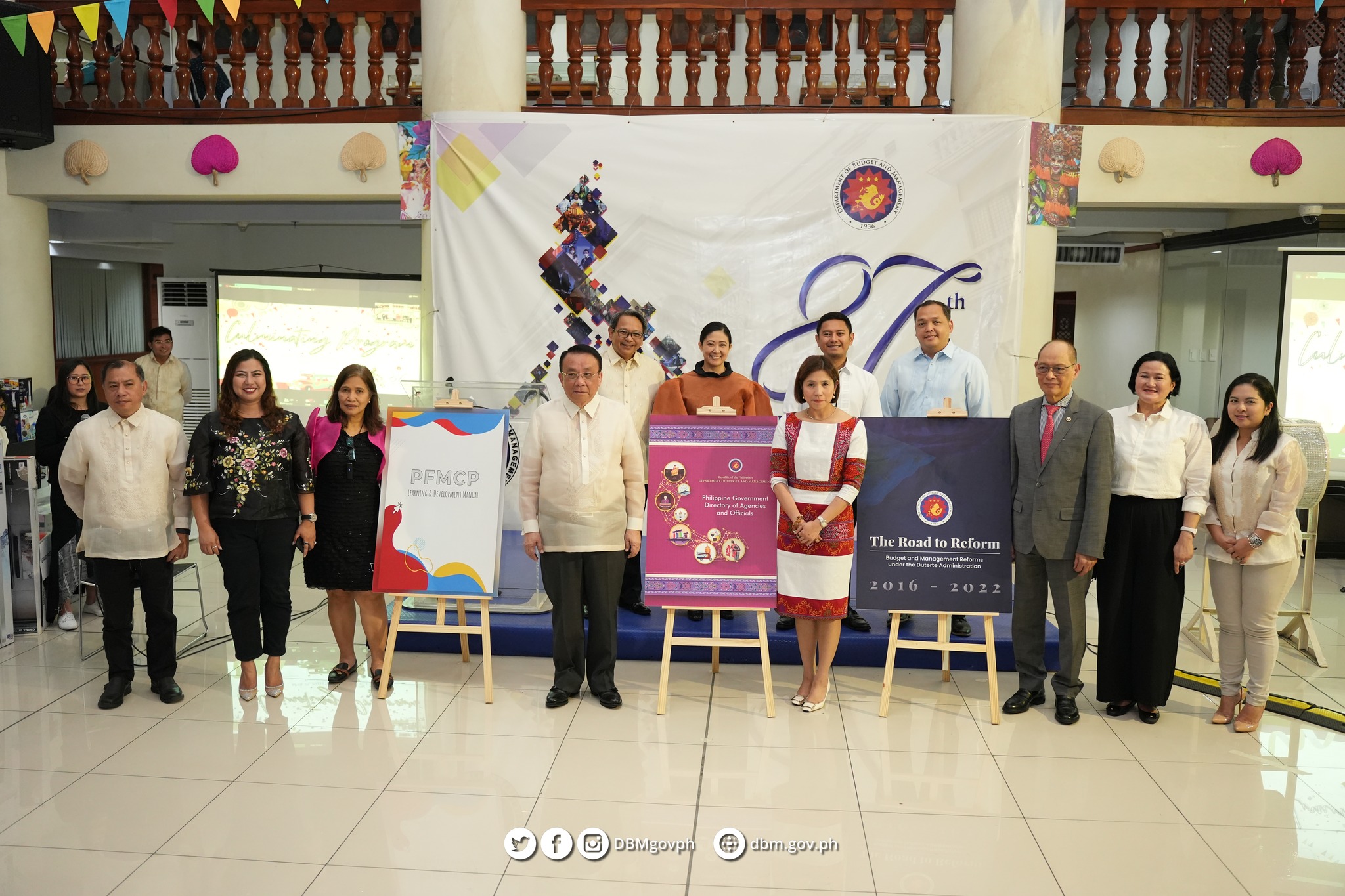
- Details

Magandang hapon po sa ating lahat! Happy 87th DBM Anniversary! iViva Las Islas Filipinas!
Assalamu alaikum wa Raḥmatullahi wa Barakatuh.
Before anything else, let me greet our Guests of Honor today, Executive Secretary Lucas Bersamin, and former DBM Secretary and now Finance Chief, Secretary Benjamin Diokno. Thank you so much for joining us on this momentous occasion.
I am well aware that all of us here have busy schedules and pending deliverables we have to park in the meantime to join this celebration.
Kaya naman po, ikinagagalak ko pong makita na tayo ay nagsama-sama ngayong hapon upang ipagdiwang ang napakahalagang okasyong ito para sa ating ahensya na itinatag noon pang 1936 bilang Budget Commission.
I also hope that you enjoyed the week-long festivities in celebration of our anniversary.
This year’s theme—Viva Las Islas Filipinas—is centered on fostering and strengthening our sense of nationalism. Hangad po namin na sa pamamagitan ng selebrasyong ito ay lalo po nating maisapuso ang dahilan ng ating paglilingkod—lahat para sa bayan.
Relatedly, this afternoon, we will honor our loyalty awardees—employees who have dedicated years of service and embodied the essence of nationalism. To our loyalty awardees, please know that you are an inspiration for all of us to continue working for the achievement of our aspirations and, ultimately, our Agenda for Prosperity.
Message of Thanks
Let me take this opportunity to extend my gratitude to all the officials and employees who made this celebration a success. I know it was not easy conceptualizing and implementing the week-long activities, but you made it all possible—through hard work and, of course, the cooperation, support, and active participation of everyone.
Also, congratulations to all the winners which will be announced later, as well as to those who participated in the competitions.
Our 87th anniversary is an all-in package—a celebration that involved all the senses. Physically—the museum tour, blood donation drive, and Palarong Pinoy; mentally—the poem writing and reels making contests, and the blessing and launch of our library; and spiritually—the thanksgiving mass. We even had a cooking competition graced by celebrity chefs, Chef Jessie Sincioco and Chef Sandy Daza.
DBM PUBLICATIONS
This afternoon, we will also unveil several DBM publications led by the Communications, Advocacy, and Stakeholder Relations Group under Usec. Margaux Salcedo.
First up is the Public Financial Management (PFM) Learning and Development (L&D) Manual, a professional and practical guide for everyone’s training and development needs.
We will also launch the “Road to Reform: Budget and Management Reforms under the Duterte Administration,” which provides a narrative on the reform journey and milestones of the Department during the term of former President Rodrigo Roa Duterte.
Finally, we have the latest edition of the Government Directory. This edition is close to my heart because, for the first time in around 30 years, the Government Directory pays tribute to the diversity of the Mindanawon life. The overall design of this publication showcases Mindanao symbols and patterns, including illustrations featuring Mindanao culture and traditions.
The directory will be distributed to all the National Government Agencies, Local Government Units (LGUs), members of Congress, media, Philippine embassies, SUCs, and consulates abroad, who have come to regard it as a handy reference.
MORE REASONS TO CELEBRATE
Indeed, we have a lot of reasons to celebrate. We have good people, a good economy, and better news with inflation rate slowing down, government spending targets being surpassed in March, and our projected real GDP being the HIGHEST in the ASEAN region according to the latest World Economic Outlook of the International Monetary Fund.
As we turn 87 this year, we continue standing for efficiency, inclusivity, and sustainability as we craft a national budget where no Filipino will be left behind, including the future generations. We continue advocating for transparency and accountability, keeping our budget and other releases open to public scrutiny. We continue working hard to make DBM future-ready, as we are already on track with our digitalization goals through our improved information systems.
We have more work ahead, but we should certainly celebrate our wins for the past 87 years. Malayo pa, pero malayo na ang ating narating.
All these and more are because of your commitment and dedication to serving the nation—nationalism at its best!
Again, happy 87th anniversary, DBM! Mabuhay po tayong lahat!
Wabillahi Tawfiq Wal Hidaya, Wasalamu alaikum wa rahmatullahi wa Barakatuhu.
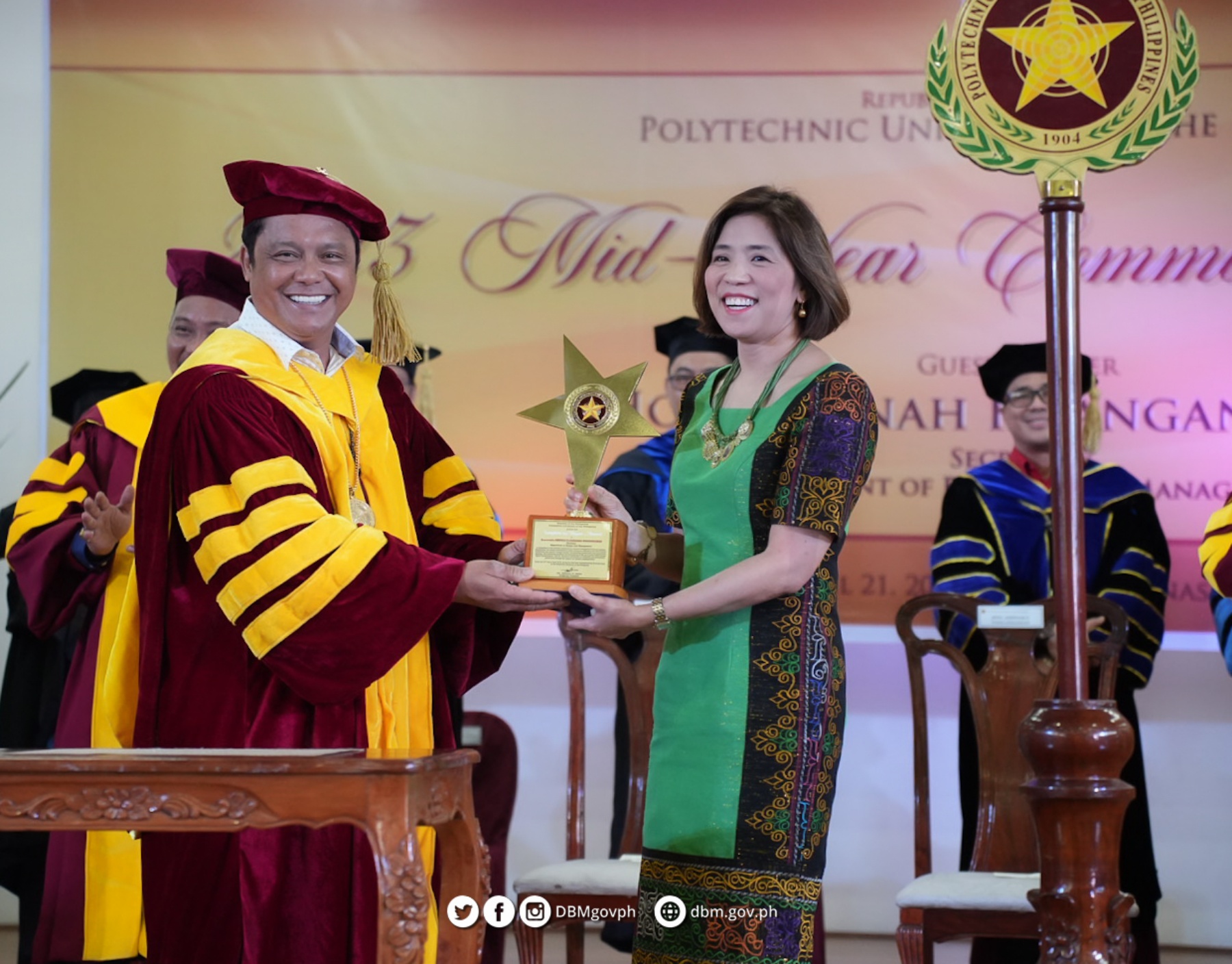
- Details

To the honorable President of the Polytechnic University of the Philippines, Dr. Manuel M. Muhi, and his fellow executive officials; members of the Board of Regents; educators, administrators, staff, the graduating students, their families and friends, magandang umaga po.
Assalamu alaikum wa Raḥmatullahi wa Barakatuh. And happy Eid Mubarak po sa ating mga kababayang Muslim.
Before anything else, I would like to congratulate all personnel of PUP, both teaching and non-teaching, for paving the way for these students from different fields to reach this milestone in their academic life. Nais ko rin pong magbigay-pugay sa mga magulang, asawa, kaibigan, o ka-opisina na kasama ng ating mga graduate students sa pagharap sa mga pagsubok sa kanilang pag-aaral at sa buhay.
Of course, ultimately, I want to congratulate you, our dear graduates, of one of the oldest and most esteemed higher education institutions in the Philippines. Regardless if you are graduating with flying colors, pumasang-awa, o na-delay nang sobra dahil sa thesis, what matters is that YOU ARE HERE. You rose above life's challenges—in your families, relationships, classrooms, and jobs, among others. Smile. Savor this moment. Give yourself a pat on the back. Be proud of this achievement.
And as you leave the halls of this university, I want to give you a simple reminder—there is power in TAKING CHANCES and MAKING CHOICES.
I took a chance at working in the Senate of the Philippines and this started my career in government service which has now lasted for almost two decades and brought me to where I am today. It entailed so much work but I took the chance because this was a great opportunity to develop myself. While I encountered many challenges in government service, it was my choice to keep reading, working for long hours, enduring, and persevering.
So, it was this series of choices that eventually made me the Head of the Policy Research Group under the Political and Constituency Office of the late Senator Edgardo J. Angara. I then became his Chief-of-Staff, and the rest is history. Because of the chances I took and the choices I made, I am here before you as the Secretary of the Department of Budget and Management.
I am certain that as graduate students of the country’s national polytechnic university, you are already familiar with the essence of these two words—CHANCES AND CHOICES. Still, allow me to share how there is an interplay between chances and choices based on my experiences as a student and a public servant.
On the one hand, when I say chances, these are possibilities beyond an individual’s control including the society and the community we are in, its cultures and norms, and the opportunities presented to us.
On the other hand, you have choices. These are your responses to the chances—that day when you submitted your application to graduate schools, that moment when you requested a study leave from work for your comprehensive exams, and that time you used holidays to study to get a passing rate. You made important choices that brought you here today.
So when life overwhelms you, in your careers, businesses, or personal engagements, find comfort in knowing that it’s always a combination of chances and choices. Do not blame yourselves if you took five years to finish your MA or MS. A part of it was chance—you might have struggled because you lost a loved one, encountered financial difficulty, or had conflicts with your current jobs. But you showed up and enrolled again—these are your choices. And when choices are made, chances are changed, built, and even overturned.
This is not to say that chances are more powerful than choices or vice versa. They both influence our lives. But my advice would be for you to focus on making the right choices by first, identifying your values, priorities, and identity, when acting and speaking accordingly.
Meanwhile, our commitment as your predecessors is to create an environment filled with opportunities wherein you can take chances to enable you to make the right choices. In my decades-long experience as a public servant—from the Legislative and Executive branches to the Bangko Sentral ng Pilipinas, and then back again to the Executive as the Budget Secretary—I learned that government decisions are chances that greatly affect the choices of our citizens.
For instance, during the pandemic, when the government provided cash assistance to displaced workers, some became successful entrepreneurs in their localities.
This is why, at the Department of Budget and Management, we carefully craft a national budget that is responsive to the needs of the time. For 2023, our priority expenditures are aligned with the 8-Point Socioeconomic Agenda that aims to address the immediate and pressing concerns of all Filipinos. These will also cater to the objectives under the Philippine Development Plan 2023 to 2028.
To give you an overview, the bulk of the Fiscal Year 2023 National Budget amounts to Php 5.268 trillion and we allotted 38 percent for the Social Services sector. This is in line with our commitment to investing in our people through major social and human capital development expenditures.
As always, we have provided the highest allocation to the Education, Culture and Manpower Development Sector amounting to Php 909.1 billion. This is consistent with the Constitutional mandate to assign the highest budgetary priority to education but more than this, it also reflects the Administration’s commitment to empowering our youth. President Ferdinand Romualdez Marcos Jr. himself, in his first State of the Nation Address, said, “Education is the only legacy we can leave our children that will never go to waste. So we will not hold back on investing in our education.”
Through this budget, we hope to address the present challenges in the Philippine education system. Specifically, this includes allocations for Basic Education Inputs with; Education Assistance and Subsidies; Universal Access to Quality Tertiary Education with Php; and Basic Education Facilities Program, among others.
Through revitalized education, I aspire to provide every Filipino with a fighting chance to manage life’s uncertainties so they can choose to achieve their full potential.
Sa pamamagitan ng pagbibigay ng prayoridad sa edukasyon, matutulungan natin ang bawat Pilipino, lalo na ang ating mga kabataan, na makamit ang kanilang mga pangarap.
These are just some of the things we have been doing to ensure that every allocation, decision, and program implementation will benefit the Filipino people today and the future generations. This is our Agenda for Prosperity. Sinisikap ng kasalukuyang administrasyon na maiangat ang buhay ng bawat mamamayan sa pamamagitan ng pag-angat ng ating ekonomiya. At unti-unti ay nakakamit na natin ito. Sa katunayan, nangunguna ang Pilipinas sa buong ASEAN Region pagdating sa projected Gross Domestic Product (GDP) ngayong taon. Itinaas ng International Monetary Fund ang real GDP projection ng Pilipinas sa 6.0 percent, kaya naman Number 1 na ang Pilipinas sa GDP growth ngayon, mas mataas kaysa sa Vietnam, India, China, at iba pa.
Ngunit hindi natin ito makakamit kung ang gobyerno lamang ang kikilos. We cannot do this alone. We need the people’s participation. And so we have also been doing everything to open up the government to the people and give them a chance to participate in the budget process.
Ngunit hindi natin ito makakamit kung ang gobyerno lamang ang kikilos. We cannot do it alone. We need the people’s participation. And so we have also been doing everything we can to open up the government to the people and give them a chance to participate in the budget process.
Let me share an advocacy on transparency and public participation that is close to my heart: the Philippine Open Government Partnership or PH-OGP. Gusto ko po kasi na parating pinapakinggan ang daing at hinaing ng taong-bayan. Open Government Partnership provides an avenue for genuine citizen participation in government processes and a platform for collaboration between champions and movers in the government alongside our active non-government actors. We are set to institutionalize PH-OGP through an Executive Order. Sinisikap po natin ang pakikipag-pulong sa taongbayan bago tayo gumawa ng mga polisiya ang gobyerno para ito ay maisa-batas.
And all of you have the chance and the choice to join us in this journey of maintaining an open government, championing fiscal transparency, and achieving prosperity that is truly inclusive and sustainable for every Filipino.
So to all the graduates: make the best choices and maximize your chances well in every moment. You can create change in the lives of others, in your community, and eventually, our country.
And in all these, may you remember one of PUP’s values: “that meaningful growth and transformation of the country are best achieved in an atmosphere of brotherhood, peace, freedom, justice, and nationalist-oriented education imbued with the spirit of humanist internationalism.”
May these resonate with you as you contribute to the next institutions you will be part of and become the drivers of economic growth in the country. It is you, the next generation of leaders, public servants, professionals, volunteers, and private workers and entrepreneurs, who will shape the social landscape of the Philippines. Embrace this responsibility and opportunity as we stand together for social justice, work towards economic equity, and concretize genuine prosperity for every Filipino.
Ngayong nakamit niyo na ang susi para sa magandang kinabukasan, siguruhin ninyo na tuluyan niyo nang bubuksan ang pinto para naman sa magandang kinabukasan ng buong bayan.
Congratulations again, my dear graduates! Be life-long learners in service to others. Mabuhay kayong lahat.
Wabillahi Tawfiq Wal Hidaya, Wasalamu alaikum wa rahmatullahi wa Barakatuhu.
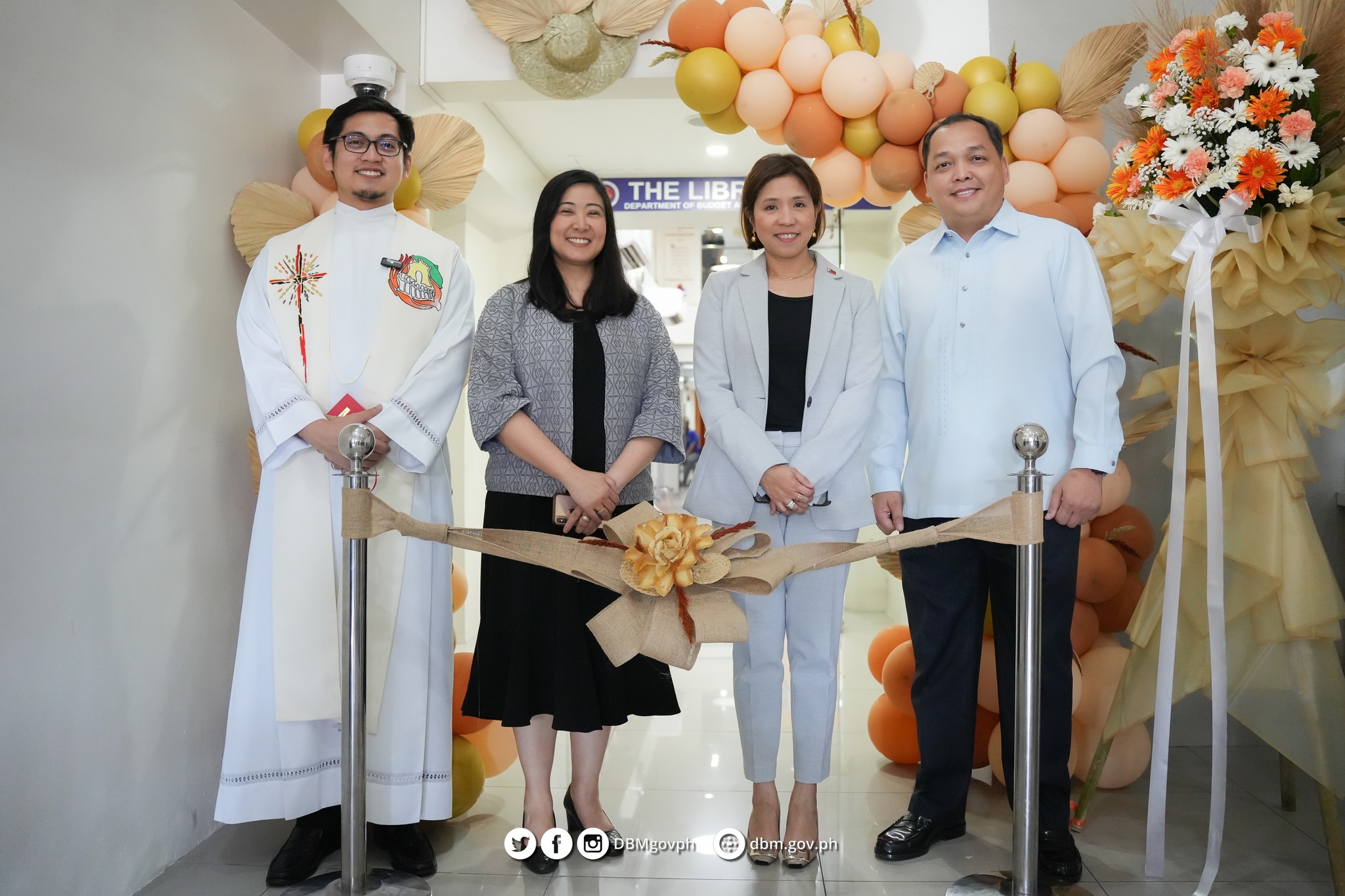
- Details

Assalamu alaikum wa Raḥmatullahi wa Barakatuh.
A pleasant afternoon to all the DBM officials and employees and guests joining us today. We have here Executive Director Dennis Santiago of PS-DBM. Thank you for joining us.
Libraries are certainly impactful in any organization. They hone our learning, reading, and even critical thinking skills and they become spaces for the creation of social interactions that lead to collaborative work and ideation. Hence, they are essential not just for schools but also for institutions like the DBM.
So, with much pride and gratitude, I join you in the celebration of the blessing and launch of the DBM Library in its new home. Knowing how the Arcache building had been a part of the DBM throughout the years and decades, we are happy to have established its perpetual value and historical significance by making this our center of knowledge.
This would not be possible without the hard work and commitment of the Advocacy, Communications, and Training Service (ACTS) and the Communications, Advocacy, and Stakeholder Relations (CAS) Group led by Undersecretary Margaux Salcedo. And of course, the Administrative Service.
Let me take this opportunity to share with you my vision for the DBM Library. I want to bring it to the future through digitalization of our collection, which I believe was already started with the help of our ICTSS. I want to make the library a learning center complete with an exhibit area, AVP room, and a multimedia library where people can access our digital collection.
As we plan for that future, let’s also be reacquainted with the valuable resources we have, the archival materials, and public financial management (PFM) books that will help us remember our history and accomplishments as an institution.
As such, we are grateful to our DBM Library’s partner agencies and institutions, including the Bangko Sentral ng Pilipinas through its Knowledge Resource Program for helping enrich our collection.
Moreover, we are geared to launch later our latest publication, the “Road to Reform: Budget and Management Reforms under the Duterte Administration.” At the Anniversary’s Culminating Program on the 25th, the Road to Reform provides a narrative on the reform journey and milestones of the Department during the term of former President Rodrigo Roa Duterte.
Lastly, in line with the 10th year publication of the DBM eUpdates, we will also award our top three contributors who help us ensure that all DBM employees are informed of the latest activities in our central and regional offices.
Before we conclude, I would like to emphasize that knowing must be followed by doing. Therefore, now that we know the new home of our library, make sure to visit and enjoy reading. Take part in knowledge-sharing.
Then from whatever we will learn, let us use it to equip ourselves better to up the ante in our service to others. Muli, magandang hapon po sa ating lahat!
Maraming salamat sa pakikiisa.

- Details

Your Excellency, Ambassador Romualdez, members of the economic team, ladies and gentlemen.
Assalamu alaikum wa Raḥmatullahi wa Barakatuh.
First, I would like to thank the Philippine Embassy, the International Monetary Fund, the World Bank, Macquarie Asset Management, HSBC, and our partners here for hosting us and giving us this opportunity to share updates on the country's economic performance and investment opportunities, and on our end at the Department of Budget and Management, our Priority Expenditures.
Today, we bring you warm greetings and good news from the Philippines. I am proud to share that in spite of global headwinds and the challenges of economic recovery after the pandemic lockdowns, we remain on track with our Agenda for Prosperity.
The agenda is economic transformation towards inclusivity and sustainability. Our priority expenditures are therefore aligned with the 8-Point Socioeconomic Agenda and cater to the objectives under the Philippine Development Plan 2023 to 2028.
To give you an overview of the Fiscal Year 2023 General Appropriations Act, the National Budget of the Philippines amounts to Php 5.268 trillion or about USD 95.0 billion. This is a 4.9 percent increase from our budget in 2022, equivalent to 21.9 percent of our GDP.
The bulk of the proposed budget has been allotted for the Social Services sector, equivalent to roughly 38.1 percent of the national budget, to ensure revitalized education, quality healthcare, and strengthened social protection. This is in line with the 8-Point Socioeconomic Agenda and our growth targets.
As mandated by the Philippine Constitution, Education remains our top priority. But we also have given the Health Sector one of the most significant increases in the budget, as part of our commitment to strengthen our healthcare system following lessons from the pandemic, as well as the mandate of President Ferdinand R. Marcos Jr. to expand access to affordable and inclusive healthcare even in the farthest regions.
We are also strengthening social protection, covering 11.7 percent of the 2023 National Budget, to ensure that no one is left behind.
Further, we are determined to make agriculture a driving force for growth and the main source of our food security. Hence, to improve agricultural productivity and re-establish the Philippines as a top exporter of agricultural products, the Agriculture and Agrarian Reform sector was allocated Php 186.4 billion (USD 3.36 billion), a budgetary boost of around 29.0 percent from its previous year’s allocation.
Recognizing that infrastructure is the backbone of the economy, we are determined to maintain infrastructure spending at 5.0 to 6.0 percent of GDP in the medium-term as set in the Medium-Term Fiscal Framework. With this in mind, we are expanding the Build, Build, Build Program of the previous administration, which we now call Build, Better, More (BBM). This was allocated Php 1.33 trillion (USD 23.9 billion) or 25.3 percent of the national budget and equivalent to 5.5 percent of GDP to sustain the momentum of the public infrastructure boom.
On infrastructure, here is the good news: as of last month, the national government has identified 194 high-impact and urgently-needed infrastructure flagship projects. These will be given top priority during the annual preparation of our government’s budget.
The bulk of the infrastructure budget is intended for the development of physical infrastructure aimed at improving physical connectivity throughout the country through the construction of accessible road networks, railways, buildings, and flood control infrastructure, among others.
Significant budgetary support was also provided for social infrastructure development, which includes the construction of school buildings, hospitals, health centers, water and power supply systems, as well as housing and community systems to support the quality of life and well-being of communities. Similarly, we have also provided funding for irrigation systems and reforestation projects.
To ensure that the Philippines becomes a viable investment destination, we are also keen on improving our digital infrastructure, which was allocated Php 24.13 billion or about USD 434.3 million, to accelerate the country’s digital transformation. We are lucky that later we will be joined by ICT Secretary Ivan John Uy. He can further elaborate on our priority projects.
Acknowledging the importance of sustainable economic growth, we have significantly increased the climate change adaptation and mitigation measures budget by 60 percent compared to the previous year’s allocation. This includes investments in water sufficiency and renewable energy infrastructure, as well as alternative resources.
Promoting genuine inclusive growth, we have automatically appropriated some Php 820.3 billion (USD 14.77 billion) to our Local Government Units (LGUs) as part of their National Tax Allotment. This is in addition to the Php 16.5 billion (USD 297 million) allocation that they will receive as part of the Local Government Support Fund (LGSF). The LGSF covers financial assistance to LGUs, the Growth Equity Fund, and support to the Barangay Development Program of the National Task Force to End Local Communist Armed Conflict.
Ensuring that this inclusive growth reaches the farthest regions, a total of Php 83.94 billion or USD 1.51 billion has been allocated for the Bangsamoro Autonomous Region in Muslim Mindanao (BARMM) as its government undergoes transition until 2025. This includes allocations for the regular budget of BARMM; its Annual Block Grant; a Special Development Fund for the rebuilding, rehabilitation, and development of its conflict-affected communities; and the region’s share in taxes, fees, and charges.
To complement the implementation of these priority programs, we shall enhance key structural reforms and introduce new ones that promote sound fiscal management, a green economy, and a more efficient and lean bureaucracy. Let me cite some of these reforms.
First, the Department of Budget and Management will forward the Progressive Budgeting for Better and Modernized Governance or the PBBM Governance Bill, which seeks to digitalize processes and transactions across all government offices through an Integrated Financial Management Information System (IFMIS) and institutionalize key Public Financial Management (PFM) reforms such as the Cash Budgeting System.
Second, we want to build an agile, efficient, and more responsive government workforce through the National Government Rightsizing Program. This will minimize and eliminate overlaps and duplication of functions, and reduce costs, processing time, and other regulatory requirements in government transactions.
Third, we are pursuing a Green Public Procurement Roadmap wherein the government will procure common-use supplies and equipment items with green specifications.
As you can see, the Philippines means business. We not only meet but surpass our economic targets. We are on track with our Agenda for Prosperity and I am confident that as long as we stay the path, we will sooner achieve single-digit poverty levels and upper middle-income class status—objectives that we identified in our Medium-Term Fiscal Framework.
Indeed, the time to invest in the Philippines is now. So, we look forward to forging more partnerships with the United States.
America is an age-old friend of the Philippines. We hope to strengthen this friendship even more as we continue to nurture our robust people-to-people ties, invigorate our dynamic bilateral relations, and pursue economic transformation.
We hope you will join us in our journey towards genuine prosperity—an inclusive and sustainable economy that would be felt by every individual, family, and business in the country.
Wasalamu alaikum wa rahmatullahi wa Barakatuhu.
Thank you. Maraming salamat at Mabuhay.
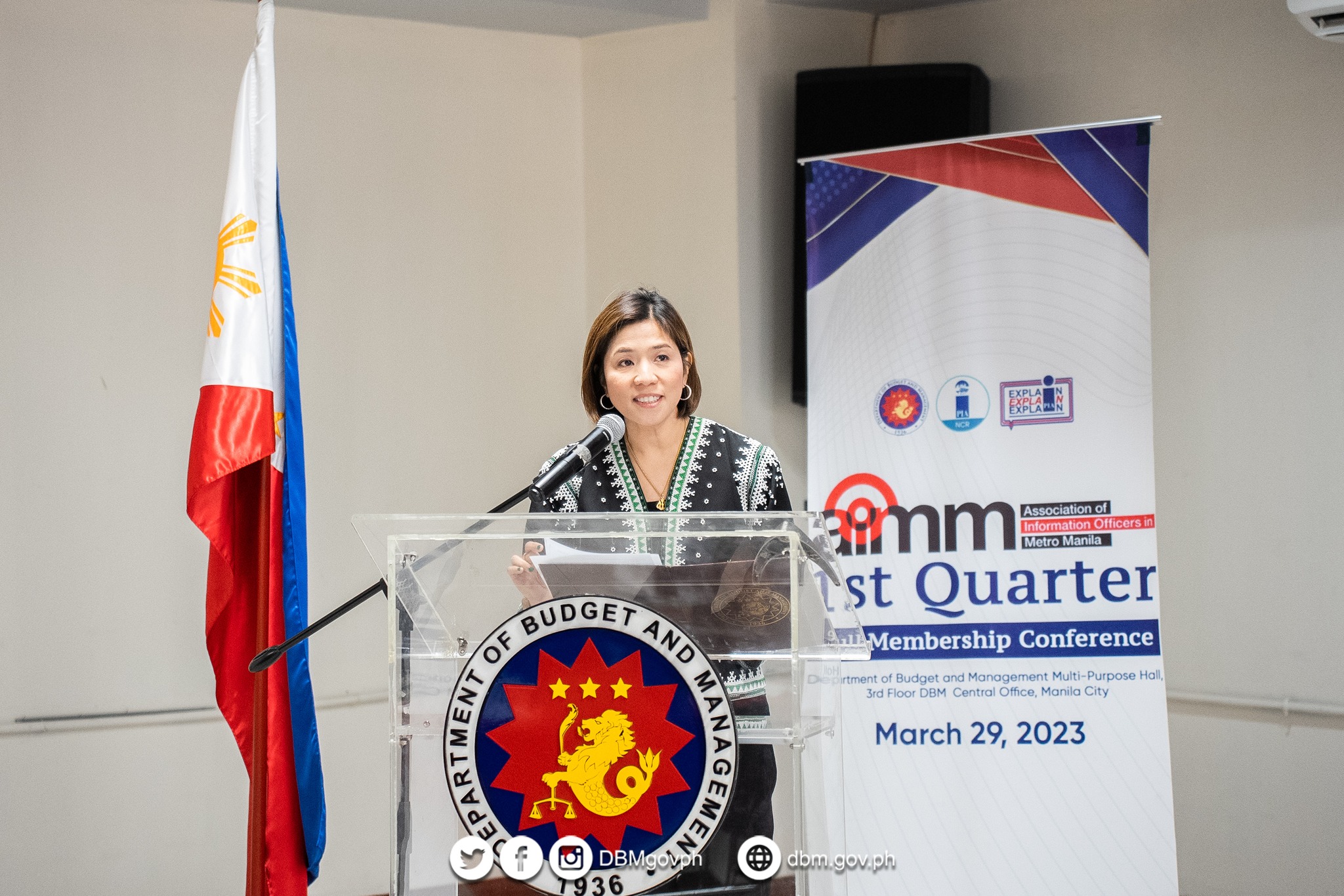
- Details

Assalamu alaikum wa Raḥmatullahi wa Barakatuh.
A pleasant morning to my fellow public servants and all our government communication practitioners. Let me take this opportunity to thank all of you for ensuring that the Filipino people are well-informed about the programs, projects, and reforms that we implement in the government.
In my years as a public servant, I’ve always been an advocate of transparency because I recognize the role of communication in nation-building. This is where all of you come in. Each of you here helps build a transparent and credible government that the public trusts. And this is vital in nation building.
In line with this, how can we, government communicators help strengthen transparency, credibility, and public trust?
First, in terms of transparency, we begin by strategizing how we can convey our messages in a way that is easily understandable to all Filipinos. We communicate with the ultimate goal of being understood by the man on the street. Through comprehensible content, we help our people see clearly the functions and decisions of our respective agencies. And with this understanding, we foster transparency which in turn helps increase our credibility and foster public trust.
As we become more transparent, more citizens will know what we are doing. We become more credible to speak of national development, socioeconomic progress, sustainability, and inclusivity, among others. Our messages become backed with pieces of evidence and concrete results in every text, photo, or video that we publish. So let us be proactive in sharing our projects and programs that serve our people.
With increased transparency and credibility, we gain public trust. By having these three, we become successful in encouraging dialogues that can truly create reforms and align the government with our people. I believe that with continuous constructive dialogues, we can truly achieve our Agenda for Prosperity where no Filipino is left behind.
To this end, we are also promoting the Philippine Open Government Partnership or PH-OGP which provides a platform for interface between the government and the citizens—another platform or avenue for transparency and public participation.
We also have our Fiscal Openness (FO) Working Group that leads the preparation and development of the DBM Fiscal Openness Action Plan and monitors the country’s performance in the Open Budget Survey (OBS) conducted by the International Budget Partnership. Further, we have operationalized the DBM Civil Society Organizations Desk to harness CSO participation by responding to their request for information and addressing their budget-related queries.
So as you write on the National Government Rightsizing Program and the Full Devolution that you will learn about today, let’s report on it with transparency, credibility and public trust in mind.
The NGRP is a major strategy for achieving bureaucratic efficiency, which, as you know, is a stated objective in the Philippine Development Plan 2023-2028. The bill has already been passed in the House of Representatives and has been forwarded in the Senate for deliberation.
On the other hand, full devolution aims to further capacitate our Local Government Units to be at the forefront of public service delivery in their respective provinces, towns, and municipalities. As you may all know, the President has directed us to further study the matter so we will again sit down and identify which specific programs, activities, and projects can be carried out by which level of governance. As information officers, it is our responsibility to get the right message across—that the national government is working closely together with the LGUs to ensure the welfare of all citizens.
With your words, points of view, and even the channels you use, you are influencing, encouraging, and creating change.
And so, I call on all information officers to remember that every word is powerful, and your words, in particular, start conversations capable of spurring change. Let us all be wise and communicate with the goal of building the nation. Let us work together in empowering the Filipino people, and increasing their trust and confidence in government.
Maraming salamat po. Assalamu alaikum Wabillahi Tawfiq Wal Hidaya, Wasalamu alaikum wa rahmatullahi wa Barakatuhu.
